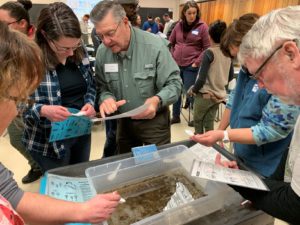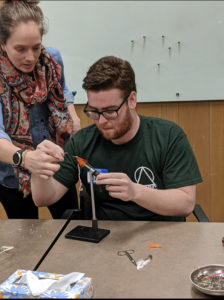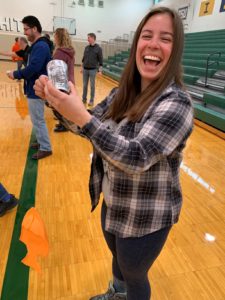Project FISH at Michigan State University
“It’s for the kids!”
This was the overarching theme of the Project FISH workshop that I attended last week with MUCC On the Water(OTW) coordinator Emma Nehan.
The workshop was part of Michigan State University’s (MSU) Agriculture and Natural Resources Week, and was attended by roughly 30 teachers, outdoor educators and passionate conservationists from all across Michigan.
Project FISH (Friends Involved in Sportfishing Heritage) is a program run by Mark Stephens of the MSU Fisheries and Wildlife Department. For the past 20 years, Mark has taught thousands of adults and children about the joys of fishing. Project FISH is successful through the help of multiple partners, and their vision is “To initiate and provide fishing education and fishing skills to interested adults and youth from Michigan’s many diverse populations.”
Mark ran the workshop and led us through the hands-on Project FISH curriculum. Mark encouraged us to “think like a fish”, as we discussed everything that a fish needs to survive (food, water, shelter, and space). This framework led us into an aquatic ecology lesson. Mark brought out a few buckets of macro-invertebrates that he had collected from a local stream and we worked through identification with a dichotomous key. There was a good assortment of caddisflies, dragonflies and we even got lucky enough to observe a tadpole madtom. A tadpole madtom is a member of the bullhead catfish family, and according to the Michigan Department of Natural Resources is one of four madtoms found in Michigan.
 We spent Tuesday afternoon focused on crafting tackle and learning to properly rig a fishing line. After learning how to tie a nightcrawler harness, a woolly bugger fly and a new spinning lure, I am excited to for the first and hopefully successful test of my newly made tackle.
On Wednesday, we began by reviewing how to care for fishing rods and reels. We also practiced our casting and learned some activities to do with kids to help them realize how much fun you can have while fishing. My favorite part of the Wednesday session was learning how to properly clean a fish with John Hesse, of the local fishing group “Fishin’ Michigan”.
We spent Tuesday afternoon focused on crafting tackle and learning to properly rig a fishing line. After learning how to tie a nightcrawler harness, a woolly bugger fly and a new spinning lure, I am excited to for the first and hopefully successful test of my newly made tackle.
On Wednesday, we began by reviewing how to care for fishing rods and reels. We also practiced our casting and learned some activities to do with kids to help them realize how much fun you can have while fishing. My favorite part of the Wednesday session was learning how to properly clean a fish with John Hesse, of the local fishing group “Fishin’ Michigan”.
I had a tremendous amount of fun at the Project FISH workshop. I am very grateful to Mark and John for teaching me some new skills, and look forward to sharing these skills with as many people as I can. The most important thing I will take away from Project Fish is the need to introduce younger generations to fishing. Teaching younger generations angling skills, ecological knowledge and ethical & sustainable fishing practices will help them develop an appreciation for our great aquatic resources.
To learn more about Project FISH as well as other opportunities to introduce young folks to fishing follow this link .
The post Project FISH at Michigan State University appeared first on Michigan United Conservation Clubs.
Recent Posts



